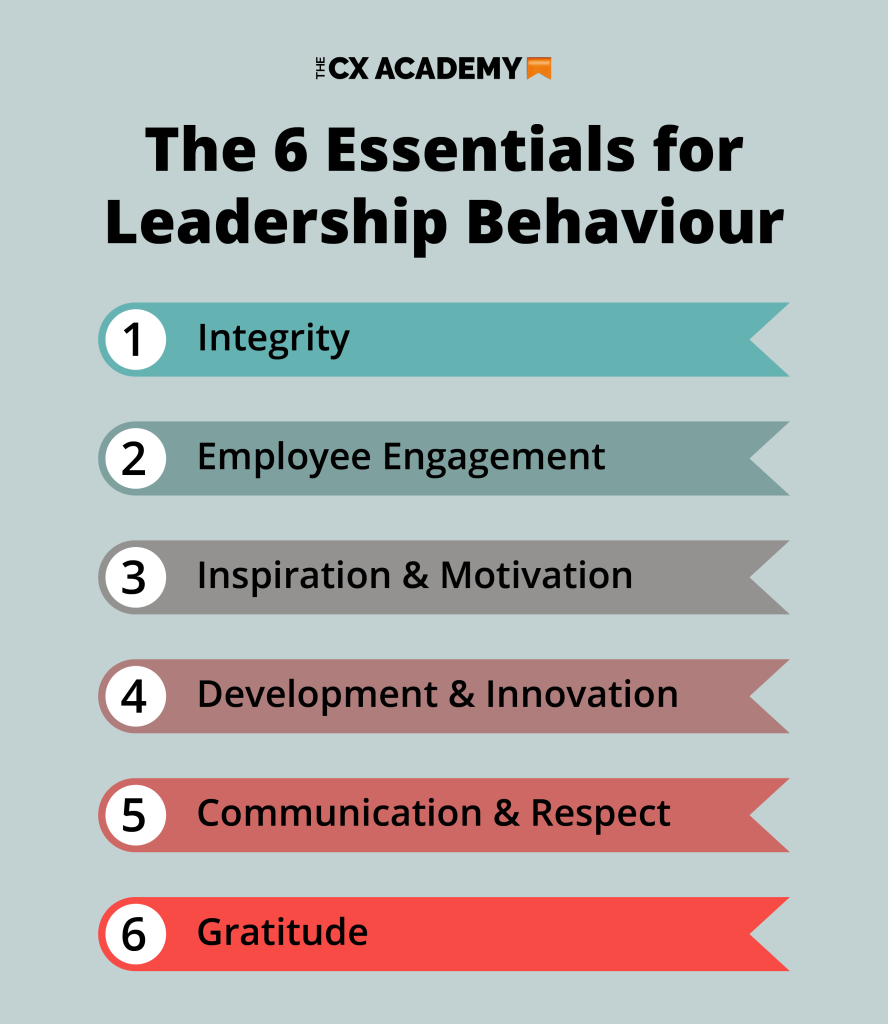
If you are a CEO, Manager, Supervisor, Team Leader you should ask yourself are you just a manager, or are you a leader?
This question is important because as Horst Schulze said, ‘Managers push: Leaders Inspire’!
What is Leadership?
Kevin Kruse explains, “Leadership is a process of social influence, which maximises the efforts of others, towards the achievement of a goal.” Although in his article Kruse also distinguishes a clear difference between leadership and management, we believe that it is possible to be both, and it is this that you should be striving to be if you are in any of the above-named positions.
What makes a good leader?
Integrity
As a leader, you need to always have strong moral principles and be honest with your employees and yourself. Essentially – you always need to do the right thing. At The CX Academy we talk a lot about CX as ‘doing the right thing for your customer.’ It’s not easy but incredibly important as you will be a direct ‘role model’ for your employees. If you lead with integrity you will set the right example for acceptable behaviour. In turn this will be reflected on the whole organisation as one committed to sustaining high ethical standards which has a direct impact on customer loyalty and reduced churn.
Trust
In one of our previous posts we discussed how trust has an incredibly large impact on employee work relationships. On The CX Academy emotional framework it is the most important driver there is.
Read more here: Psychology of Employee Relationships
Trust is the backbone of any relationship. As a leader it’s even more important as you will want to inspire others – and nobody will be inspired if they don’t trust you. More importantly, it’s not a once-off initiative. It is a continuous process that you need to carry out throughout your career.
Emotional Intelligence
Emotional intelligence is about being aware of your emotions, how to manage them and how to use them to get along with others. It includes factors such as self-awareness, self-regulation, motivation, empathy and social skills.
Check out: Emotional Intelligence to find out more.
The more you know about yourself, your weaknesses and your strengths the more impactful your leadership will be. Having empathy towards your employees will also mean that you will be viewed in a much more positive light by them.
Emeritus said, “Experts believe that intelligence quotient (IQ), technical skills, and communication skills are irrelevant if a leader lacks emotional intelligence. The growing importance of emotional intelligence has forced many leaders to learn and implement it into their leadership style to incite innovation, job satisfaction, and a positive working environment in their company.”
As a business owner you should be working on your emotional intelligence as it will have a direct impact on your employees and how they carry out their tasks. You should lead by example and be open to discussions with your staff. Evaluate your performance and ask your staff to do the same. If they match you’ll know you are self-aware. Use your social skills and empathy to understand your staff and their issues.
Gratitude
Saying very simple words like, ‘Thank you’ can have an immense impact on your staff’s productivity and engagement levels. Showing gratitude lets your employees know that they are an important part of the team and that they’re valued.
On a deeper level studies have shown that there is a direct correlation between gratitude and our well-being. “It has been established that gratitude leads to benefits for both mental health and interpersonal relationships.” As well as this, a Glassdore study showed that “four in five (81%) employees report they’re motivated to work harder when their boss shows appreciation for their work”. Similarly, research proved that when a leader shows appreciation to their employees, the sick-leave decreases.
Communication
Having good communication skills is extremely important for positive employee relationships. However, if you are a leader it’s even more important.
A leader must have good communication skills as they are there to inspire and motivate the employees, and they need to be heard and understood. This is especially important in task delegation and feedback. Likewise, you need to be able to understand your employees, their strengths, weaknesses and issues they might be facing.
As a leader you need to be able to adapt your communication style to suit the person you are talking to so that your message is well understood by them. As Harvard business School says, “Every employee’s motivations are different, so knowing how to tailor your communication is essential to influencing others and reaching organisational goals.”.
Courage
Confident leadership is able to drive your brand’s development forward. However, making bold decisions is not the only place where you need courage.
A courageous leader should seek and receive honest feedback, that sometimes may be hard to hear. On top of this, they should be able to admit to mistakes and to challenge themselves to think differently and outside of the box.
Respect
Having respect for your employees means that you value their skills and work and you recognise their worth in the office. It also means that you show appreciation for someone’s traits and qualities. Essentially, it means to treat someone with dignity and gratitude.
Respect is earned through being respectful. Therefore, the more respect you will show for your team and employees, the more respected you will be. When you are respectful towards your employees, a sense of safety is created, where both parties feel comfortable sharing their thoughts and being themselves. It is also in this environment that discussions of opposing opinions, needs and wants can happen.
What is expected of you as a leader?
As a leader you should always be clear about your expectations, communicating clearly to each team member what their specific tasks and responsibilities are. Along with this you should define goals, both for the team members and for yourself.
You should lead by example, and inspire others to strive for excellence in everything they do. You can do this by showing respect, gratitude and humility. You should show that you are part of the team, rather than a God looking above ordering others around.

How can you be a good leader?
The key to being a good leader is to practice the above key characteristics daily, and always support your staff in the way that is best for them. Ensure you are not expecting from them what you are not able to commit to. Be a thought leader and lead by example by displaying knowledge behind all your actions. Depending on your profession you may need to get a qualification to support your experience. If you are working with teams such as the customer support team, you should have a professional qualification to support your years of experience.
Most importantly, lead with a passion and inspire your employees and team members to strive to be the best they can be at their job.
If you would like to become a great leader in your workplace, enrol in our Professional Diploma or Certificate and get the knowledge, confidence and skills you need to lead by example.
